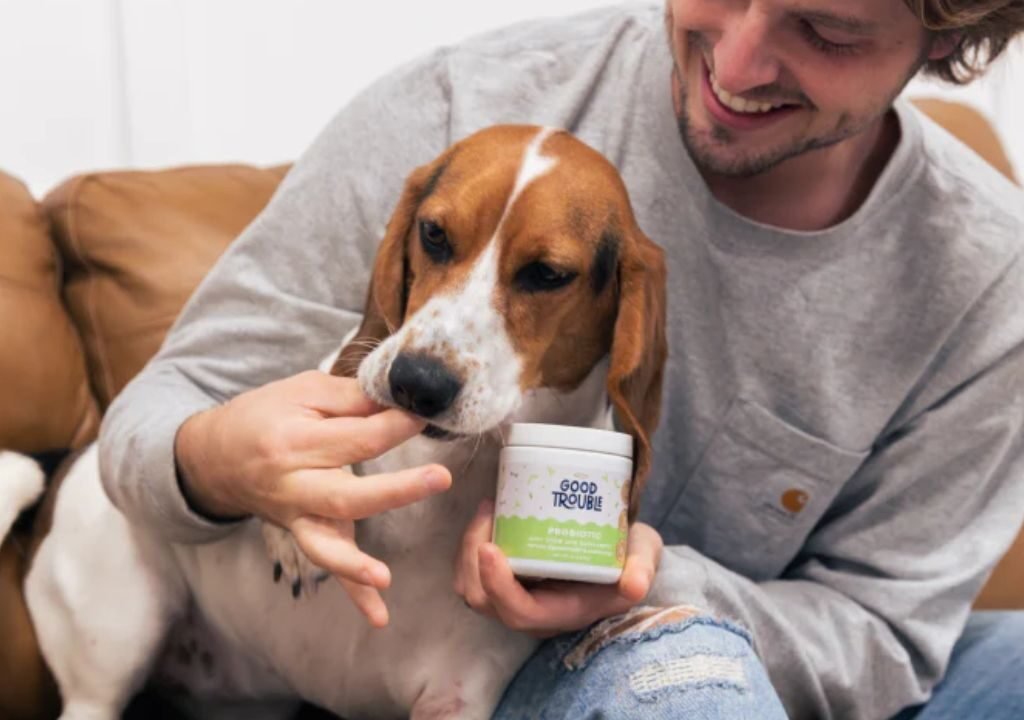
Are you searching for an effective way to support your dog’s digestive wellness? Probiotic chews for dogs have emerged as one of the most popular and convenient solutions for pet parents looking to enhance their furry friend’s gut health. These tasty supplements offer a simple approach to maintaining your dog’s digestive balance while providing numerous additional health benefits.
With the pet supplement market evolving rapidly in 2025, understanding how probiotic chews for dogs work and selecting the right product has become more important than ever. Whether your canine companion struggles with occasional digestive upset, experiences seasonal allergies, or you simply want to boost their overall health, these beneficial supplements could be the game-changer you’ve been seeking.
Understanding Probiotic Chews for Dogs: What Makes Them Special?
Probiotic chews for dogs contain carefully selected beneficial bacteria strains designed to support your pet’s gastrointestinal system. These microorganisms live in your dog’s gut and contribute to a healthy gastrointestinal system, with about 95% of these microorganisms residing in the digestive tract. Unlike traditional probiotic powders or capsules, chewable forms offer enhanced palatability and easier administration.
The convenience factor sets probiotic chews apart from other supplement formats. Most dogs eagerly consume these treats, eliminating the struggle many pet owners face when trying to administer medication or supplements. This improved compliance ensures your dog receives consistent probiotic support for optimal digestive health.
The Science Behind Canine Probiotics
Probiotics aid in the digestion of food, fight off potential pathogens, make nutrients and vitamins, and bolster the immune system. The term “probiotic” combines the Latin “pro” (for) and Greek “bio” (life), literally meaning “for life.” This definition perfectly captures their role in supporting your dog’s vitality and wellness.
Recent 2025 research has identified specific probiotic strains that offer targeted benefits for dogs. Bifidobacterium animalis has been demonstrated to reduce acute diarrhea and improve overall intestinal health, making it a valuable ingredient in high-quality probiotic chews.
Key Benefits of Probiotic Chews for Dogs
1. Enhanced Digestive Function
The primary advantage of probiotic chews for dogs lies in their ability to promote healthy digestion. Daily consumption of these soft probiotic chews may reduce gas and bloating and help dogs sustain normal stool consistency and bowel movements. This makes them particularly beneficial for dogs experiencing occasional loose stools or digestive discomfort.
2. Strengthened Immune System Support
A healthy gut directly impacts immune function, as approximately 70% of the immune system resides in the digestive tract. Probiotics offer enhanced immune function and a reduced risk of diseases, providing comprehensive health support beyond digestive benefits.
3. Allergy and Environmental Sensitivities Management
Many pet owners discover that probiotic chews help their dogs manage seasonal and environmental sensitivities. By promoting a healthy gut microbiome and immune function, these supplements can support your pup’s response to seasonal allergies.
4. Behavioral Benefits
Emerging research suggests probiotics may influence canine behavior. Dogs who took specific probiotic strains were less likely to bark, jump, spin or pace in situations that normally caused them distress and were more likely to explore new environments.
What to Look for in Quality Probiotic Chews for Dogs
CFU Count and Potency
Colony Forming Units (CFU) indicate the number of viable bacteria in each chew. 2 billion CFUs per chew is perfect for a small dog’s digestive system, while larger dogs may benefit from higher concentrations. Quality products typically range from 1-5 billion CFUs per serving.
Beneficial Bacterial Strains
The most effective probiotic chews for dogs contain multiple beneficial strains. Lactobacillus and Bifidobacterium species provide comprehensive digestive support, while Enterococcus faecium has been shown to shorten the course of diarrhea in dogs.
Additional Supportive Ingredients
Premium probiotic chews often include complementary ingredients that enhance their effectiveness:
- Prebiotics: Feed beneficial bacteria and promote their growth
- Digestive Enzymes: Aid in breaking down food nutrients
- Natural Flavoring: Improve palatability without artificial additives
- Pumpkin and Ginger: These ingredients ensure maximum gut health and provide additional digestive support
How Probiotic Chews Support Different Health Conditions
Digestive Upset and Diarrhea
For dogs experiencing occasional digestive issues, probiotic chews provide gentle, natural support. The beneficial bacteria help restore microbial balance, reducing symptoms like loose stools, gas, and bloating. Many pet owners notice improvements within 7-14 days of consistent use.
Post-Antibiotic Recovery
Antibiotics can disrupt the natural gut microbiome, making probiotic supplementation crucial during and after treatment. Probiotic chews for dogs help replenish beneficial bacteria, supporting faster recovery and reducing the risk of antibiotic-associated digestive upset.
Senior Dog Support
Aging dogs often experience decreased digestive efficiency and immune function. Regular probiotic supplementation can help maintain digestive health and immune support in senior pets, contributing to their overall quality of life.
Stress-Related Digestive Issues
Dogs experiencing stress from travel, boarding, or environmental changes may develop temporary digestive problems. Probiotic chews provide stabilizing support during these challenging periods.
Proper Administration and Dosage Guidelines
Starting Your Dog on Probiotic Chews
Begin with the manufacturer’s recommended dosage based on your dog’s weight. Most products suggest giving chews once or twice daily with meals to maximize absorption and minimize stomach upset. Consistency is key – daily administration provides the best results.
Monitoring Your Dog’s Response
Watch for positive changes in your dog’s digestion, energy levels, and overall well-being. Some dogs show improvement within days, while others may require several weeks to experience full benefits. Keep a journal to track changes and discuss observations with your veterinarian.
Storage and Shelf Life Considerations
Proper storage ensures probiotic viability. Keep chews in a cool, dry place away from direct sunlight. Many products require refrigeration after opening to maintain potency. Check expiration dates regularly and discard expired products.
Choosing the Best Probiotic Chews for Your Dog
Consider Your Dog’s Specific Needs
Different dogs have varying requirements based on age, size, health status, and sensitivities. Puppies may need different formulations than senior dogs, while dogs with food allergies require hypoallergenic options.
Quality and Manufacturing Standards
Select products from reputable manufacturers that follow strict quality control measures. Look for third-party testing, GMP (Good Manufacturing Practices) certification, and clear labeling of ingredients and CFU counts.
Veterinary Recommendations
Consult your veterinarian before starting any new supplement regimen. They can provide personalized recommendations based on your dog’s health history and current medications.
Read more about: Lone Wolf Ranch Dog Food: Chuck Norris’ Premium Formula Worth the Hype? (2025 Review)
Potential Side Effects and Precautions
Common Initial Reactions
Some dogs may experience mild digestive changes when first starting probiotic chews, including temporary loose stools or increased gas. These symptoms typically resolve within a few days as the digestive system adjusts.
When to Consult Your Veterinarian
Contact your veterinarian if your dog experiences persistent digestive upset, refuses to eat, shows signs of allergic reaction, or if symptoms worsen after starting probiotics. Dogs with compromised immune systems or serious health conditions require professional guidance.
Drug Interactions
While probiotics are generally safe, inform your veterinarian about all supplements and medications your dog receives. Some antibiotics may reduce probiotic effectiveness if given simultaneously.
Maximizing the Benefits of Probiotic Chews for Dogs
Dietary Considerations
Support probiotic effectiveness with a high-quality, balanced diet. Avoid sudden dietary changes that could disrupt gut bacteria balance. Consider incorporating prebiotic-rich foods like plain pumpkin or sweet potato.
Lifestyle Factors
Minimize stress, provide regular exercise, and maintain consistent feeding schedules to support optimal digestive health. These factors work synergistically with probiotic supplementation.
Long-term Use and Maintenance
Most dogs benefit from ongoing probiotic support, especially those with chronic digestive sensitivities or senior pets. Work with your veterinarian to develop a long-term wellness plan that includes appropriate supplementation.
The Future of Probiotic Chews for Dogs in 2025
The pet supplement industry continues advancing with new research and improved formulations. Expect to see more targeted probiotic strains, enhanced delivery systems, and personalized supplements based on individual dog needs. A healthy gut is essential for your dog’s overall well-being, affecting everything from digestion to immunity and even mood.
As we move through 2025, the focus on preventive pet healthcare continues growing, with probiotic chews playing an increasingly important role in maintaining canine wellness. These supplements represent a proactive approach to pet health, supporting dogs throughout all life stages.
Making the Right Choice for Your Furry Friend
Probiotic chews for dogs offer an excellent opportunity to support your pet’s digestive health conveniently and effectively. By understanding the benefits, knowing what to look for in quality products, and working with your veterinarian, you can make informed decisions that benefit your dog’s long-term wellness.
Remember that every dog is unique, and what works best for one may not be ideal for another. Take time to observe your dog’s response, maintain consistency in administration, and adjust as needed based on their individual requirements and your veterinarian’s guidance.
Frequently Asked Questions About Probiotic Chews for Dogs
About the Author:
Hi, I'm Emilia! I've been passionate about sharing valuable pet care insights for over 10 years, and I love helping fellow pet owners provide the best care for their furry companions. My goal is to make pet care information accessible and helpful for everyone. Please remember to always consult your veterinarian before implementing any health advice or treatments for your pet.

